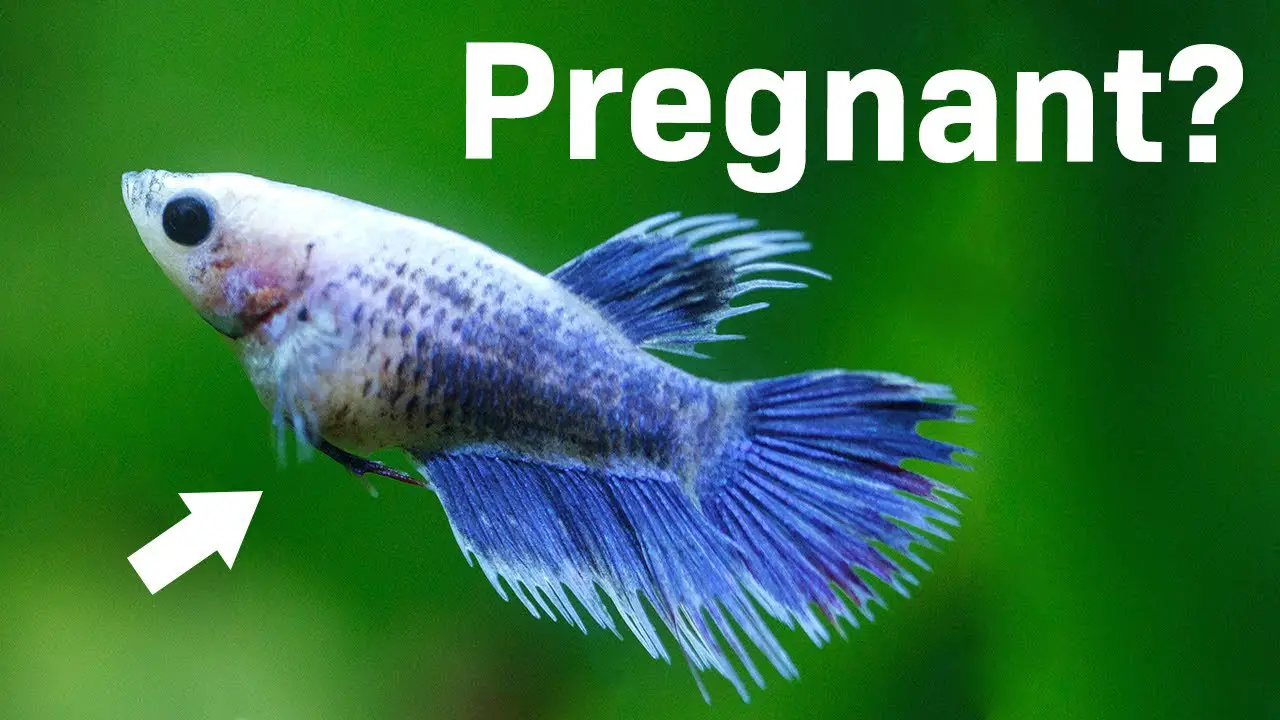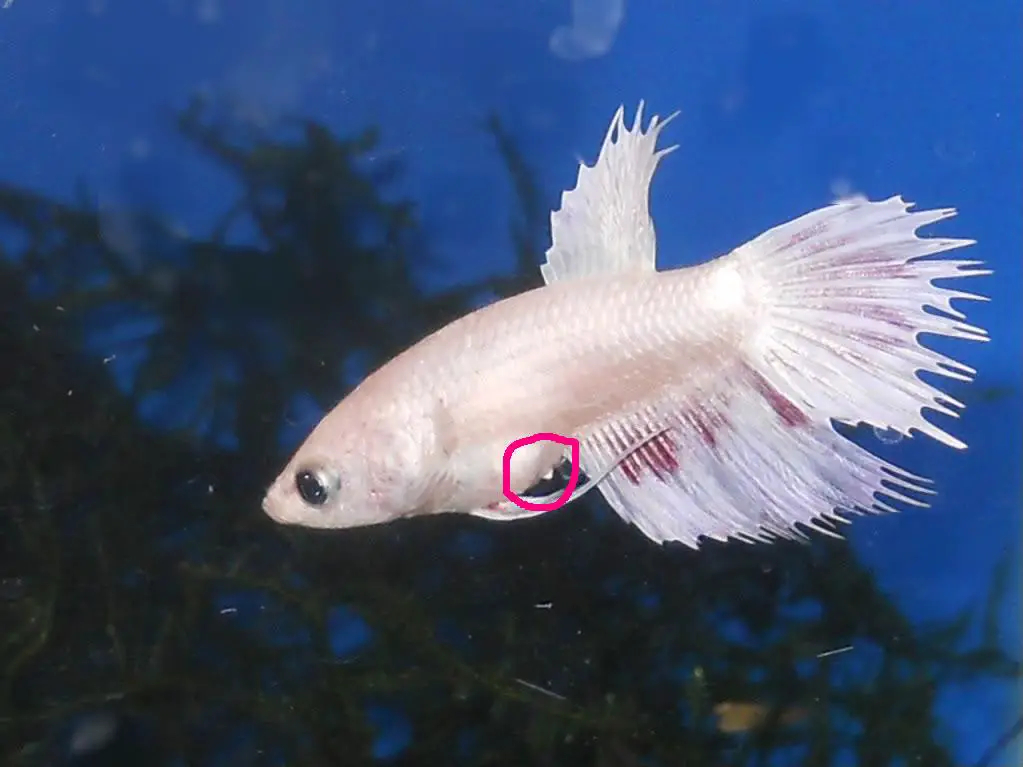Have you ever wondered if your beloved betta fish is pregnant? Well, you’re not alone! Betta fish are known for their vibrant colors and elegant fins, but they can also be tricky to care for, especially if you don’t know how to tell if they’re pregnant.
Fortunately, there are a few simple signs that you can look out for to determine if your betta fish is expecting. From changes in behavior to physical changes in their appearance, we’ll cover everything you need to know in this guide on how to tell if a betta fish is pregnant. So, let’s dive in and learn more about these beautiful creatures!
How to Tell if a Betta Fish is Pregnant?
If you are wondering whether your Betta fish is pregnant or not, look for these signs: a swollen belly, enlarged and darkened gravid spot near the anal vent, vertical stripes on the body, and a decreased appetite. You can also gently press the area behind the vent to check for eggs. However, Betta fish don’t actually get pregnant; they lay eggs. Female Betta fish can store sperm for several weeks and lay up to 100 eggs at once, so it’s important to provide them with a suitable breeding environment.

How to Tell if a Betta Fish is Pregnant?
Betta fish are fascinating creatures that make great pets. They are known for their vibrant colors, long flowing fins, and their ability to create bubble nests. But if you have a female betta fish, you may be wondering how to tell if she is pregnant. In this article, we will discuss the signs that indicate a betta fish is pregnant and what you should do if you suspect your fish is carrying eggs.
Physical Signs of a Pregnant Betta Fish
The first and most obvious sign that your betta fish is pregnant is a swollen belly. A pregnant betta fish will have a noticeably rounder belly than usual. You may also notice that her scales are slightly raised, giving her a pinecone-like appearance. This is a sign that the female is carrying eggs.
Another physical sign of a pregnant betta fish is a darkened ovipositor, which is located near the ventral fins. The ovipositor is used by the female to lay her eggs. When a betta fish is pregnant, this area will become darker in color. This is a clear indication that she is carrying eggs and preparing to lay them.
Behavioral Signs of a Pregnant Betta Fish
In addition to physical signs, there are some behavioral changes that you may notice in a pregnant betta fish. One of the most common behaviors is a lack of appetite. A pregnant betta fish may become less interested in food as she prepares to lay her eggs.
You may also notice that your betta fish is spending more time near the bottom of the tank. This is because she is preparing to build a nest for her eggs. A pregnant betta fish will start to gather bubbles from the surface of the water and create a bubble nest. This is another clear indication that your fish is pregnant.
What to Do if You Suspect Your Betta Fish is Pregnant
If you suspect that your betta fish is pregnant, there are a few things you should do to ensure her health and the health of her eggs. First, make sure that your aquarium is properly set up for breeding. This means providing plenty of hiding places and a clean, well-maintained environment.
You should also provide your betta fish with plenty of high-quality food to ensure that she has the nutrients she needs to carry her eggs to term. A high-protein diet is particularly important during this time.
Finally, make sure to monitor your betta fish closely and watch for any signs of distress. If you notice any unusual behavior or symptoms, such as lethargy or a lack of appetite, it is important to seek veterinary care immediately.
Benefits of Breeding Betta Fish
Breeding betta fish can be a rewarding experience for pet owners. It allows you to watch the intricate mating behavior of these beautiful creatures and can lead to the creation of new and unique color patterns.
Breeding your betta fish can also be a way to ensure the survival of certain strains of betta fish. Many betta fish strains are endangered, and breeding them in captivity can help to preserve their genetics and ensure that they continue to thrive.
Conclusion
In conclusion, if you have a female betta fish, it is important to know how to tell if she is pregnant. Look for physical signs such as a swollen belly and a darkened ovipositor, as well as behavioral signs such as a lack of appetite and bubble nest building.
If you suspect that your betta fish is pregnant, make sure to provide her with the proper care and nutrition she needs to carry her eggs to term. And if you have any concerns or notice any unusual behavior, seek veterinary care immediately. Breeding betta fish can be a rewarding experience, but it is important to ensure the health and wellbeing of your fish throughout the process.
Frequently Asked Questions
Here are some commonly asked questions about how to tell if a Betta fish is pregnant:
How can you tell if a Betta fish is pregnant?
Unlike mammals, it is difficult to tell if a Betta fish is pregnant just by looking at them. However, there are some signs you can look out for:
1. A bulge in the belly area: Pregnant Betta fish will have a noticeable bulge in their belly area. This is where the eggs are stored.
2. Changes in behavior: Pregnant Betta fish may become more lethargic and less active. They may also start to eat less.
How long is the gestation period for Betta fish?
The gestation period for Betta fish can vary, but it typically takes around 2-3 weeks. During this time, the female Betta will carry the eggs in her belly until they are ready to be released.
It is important to note that Betta fish do not actually get pregnant like mammals do. Instead, the female Betta will release her eggs and the male Betta will fertilize them outside of the body.
What should you feed a pregnant Betta fish?
It is important to feed your pregnant Betta fish a balanced and nutritious diet to ensure the health of both the mother and her eggs. Some good options include:
1. High-quality Betta fish pellets: These should provide all the necessary nutrients for your Betta fish.
2. Live or frozen foods: Bloodworms, brine shrimp, and daphnia are good options that can provide additional nutrition for your Betta fish.
How many eggs can a Betta fish lay?
The number of eggs a Betta fish can lay can vary depending on the individual fish. However, on average, female Betta fish can lay anywhere from 10-40 eggs at a time.
The male Betta fish will then fertilize the eggs and the female will care for them until they hatch. It is important to provide a safe and comfortable environment for the female Betta and her eggs during this time.
What should you do if your Betta fish is pregnant?
If you suspect that your Betta fish is pregnant, there are a few things you can do to ensure that she and her eggs stay healthy:
1. Provide a safe and comfortable environment: Make sure your Betta fish has a clean and spacious tank with plenty of hiding spots.
2. Feed a balanced and nutritious diet: As mentioned earlier, a good diet is essential for the health of your pregnant Betta fish and her eggs.
3. Observe and monitor behavior: Keep an eye on your Betta fish and look out for any signs of distress or illness. If you notice anything unusual, seek the advice of a veterinarian who specializes in fish.

How to know if a female BETTA is super pregnant and ready for the spawning of eggs
In conclusion, identifying whether your betta fish is pregnant or not can be a challenging task. However, by paying close attention to their physical appearance and behavior, you can gain clues that will help you make an informed decision.
Remember to look for the telltale signs of pregnancy, such as a distended belly and a decrease in appetite. Additionally, observe your betta’s behavior for any changes in energy levels or nesting behavior.
Lastly, keep in mind that while breeding betta fish can be a rewarding experience, it requires a lot of preparation and care. Make sure to do your research and consult with a veterinarian or experienced breeder before attempting to breed your bettas. With patience and dedication, you can provide a safe and healthy environment for your betta fish to thrive in.
